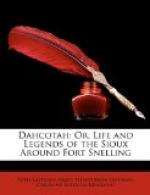Sometimes a young girl dare not run away; for she has a miserly father or mother who may not like her lover because he had not enough to give them for her; and she knows they will persecute her and perhaps shoot her husband. But this does not happen often. Just as, once in a hundred years in a Christian land, if a girl will run away with a young man, her parents run after her, and in spite of religion and common sense bring her back, have her divorced, and then in either case the parties must, as a matter of course, be very miserable.
But the marriage that we are about to witness, is a “marriage in high life” among the Dahcotahs, and the bride is regularly bought, as often occurs with us.
“Walking Wind” is not pretty; even the Dahcotahs, who are far from being connoisseurs in beauty do not consider her pretty. She is, however, tall and well made, and her feet and hands (as is always the case with the Dahcotah women) are small. She has a quantity of jet-black hair, that she braids with a great deal of care. Her eyes are very black, but small, and her dark complexion is relieved by more red than is usually seen in the cheeks of the daughters of her race. Her teeth are very fine, as everybody knows—for she is always laughing, and her laugh is perfect music.
Then Walking Wind is, generally speaking, so good tempered. She was never known to be very angry but once, when Harpstenah told her she was in love with “The War Club;” she threw the girl down and tore half the hair out of her head. What made it seem very strange was, that she was over head and ears in love with “The War Club” at that very time; but she did not choose anybody should know it.
War Club was a flirt—yes, a male coquette—and he had broken the hearts of half the girls in the band. Besides being a flirt, he was a fop. He would plait his hair and put vermilion on his cheeks; and, after seeing that his leggins were properly arranged, he would put the war eagle feathers in his head, and folding his blanket round him, would walk about the village, or attitudinize with all the airs of a Broadway dandy. War Club was a great warrior too, for on his blanket was marked the Red Hand, which showed he had killed his worst enemy—for it was his father’s enemy, and he had hung the scalp up at his father’s grave. Besides, he was a great hunter, which most of the Dahcotahs are.
No one, then, could for a moment doubt the pretensions of War Club, or that all the girls of the village should fall in love with him; and he, like a downright flirt, was naturally very cold and cruel to the poor creatures who loved him so much.
Walking Wind, besides possessing many other accomplishments, such as tanning deer-skin, making mocassins, &c., was a capital shot. On one occasion, when the young warriors were shooting at a mark, Walking Wind was pronounced the best shot among them, and the War Club was quite subdued. He could bear everything else; but when Walking Wind beat him shooting—why—the point was settled; he must fall in love with her, and, as a natural consequence, marry her.




